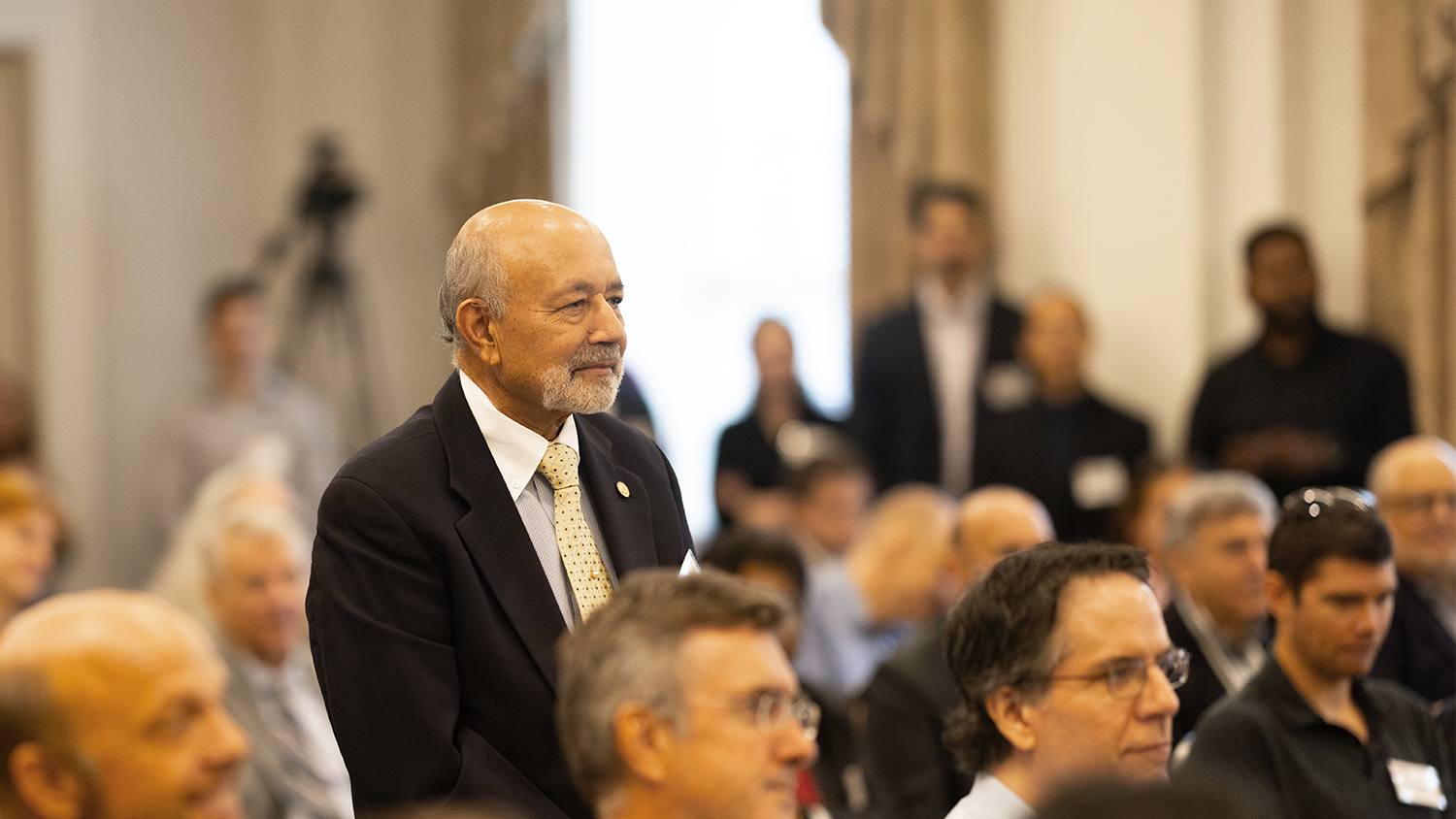Engineering entrepreneurship
Get to know four startups created by NC State engineering alumni.

Building a business takes discipline, a willingness to explore all options and an ability to think outside the box — all skills that College of Engineering (COE) alumni learned at NC State.
Engineering and entrepreneurship are often closely related, and many NC State engineers and computer scientists have created their own startups. Some entrepreneurs are just getting their businesses off the ground, while others have led successful companies for years. Among the most well-known startups created by COE alumni is Wolfspeed, Inc., formerly Cree, which develops wide bandgap semiconductors.
NC State Entrepreneurship offers many resources, including entrepreneurship competitions like the eGames, where prize money can help support startups; fellowships, such as the Miller Fellowship for recent graduates who want to pursue their venture full time; and mentorship programs including the Andrews Launch Accelerator, which provides seed money and guidance.
Ricardo Sucre and Gustavo Darquea G., Casalú

Casalú is a rum-based seltzer developed by three NC State alumni who wanted to create a drink authentic to the Latino experience and culture, integrating with arts, music, sports and fashion.
Ricardo Sucre, co-founder and CEO, and Gustavo Darquea G., head of operations, both earned degrees in industrial engineering in 2018 and 2019, respectively. They teamed up with co-founder and CEO Gabriel Gonzalez, business administration ’16.
The trio met through a larger group of Latino students who studied and hung out together at NC State. Sucre is from Venezuela, and Darquea is from Ecuador. The name stands for the company’s vision — casa, a sense of home and heritage, and salú, an open door to all who want to share Latino culture.
“That connection that we had as Latinos, that way that regardless of where we came from, our cultures translated pretty easily into the way we share and the way we enjoy together,” Sucre explained.
Sucre made the first version of the drink using a SodaStream, lemon and dark rum, which is what he drank at home. After a positive response from his friends, he reached out to Darquea, whose discipline he knew he could rely on for market research and other logistics. In 2021, Casalú joined the Andrews Launch Accelerator, which provided a support system as the team navigated licensing, branding and setting the foundation for the company.
“The work that the people at the Andrews Launch Accelerator have done for us is amazing. It is an incredible resource for NC State students,” Darquea said.
Casalú launched this April in Miami.
Cathy Gomes, 700 Rivers

Cathy Gomes, chemical engineering ‘15, works by day at Merck, and spends her evenings running 700 Rivers, a sustainable lifestyle brand that sells soaps and other products made by women artisans in Bangladesh.
She is driven by her passion for making the world a better place. At Merck, she works on optimizing a treatment for bladder cancer. As CEO of 700 Rivers, she employs 28 women who are paid living wages for their work making eco-friendly products. Gomes partners with a fair-trade organization in Bangladesh that provides access to mental health care and job opportunities to women who have escaped human trafficking.
Gomes’ parents immigrated to the U.S. from Bangladesh before she was born so that she and her sisters would have equal opportunities, especially in education.
“This all fit together,” she said. “I have this Bangladeshi background where I understand the culture, I speak the language, and I’m so passionate about making a difference here, on top of my chemical engineering background.”
Her chemical engineering background is how she landed initially on soap making, as she understands the chemistry behind it and can teach that skill to others. She also partners with South Asian farmers to source local, natural ingredients.
Gomes’ long-term plan is to expand 700 Rivers into a global company. “My ultimate goal is to help empower as many women as possible, and one of the best ways to do that is through fair living wages, safe work and equal access to job opportunities,” she said.
Shraddha Rathod, Freshspire

Freshspire, launched in 2018 by Shraddha Rathod, helps local retailers and restaurants more efficiently source food from small- and mid-size farms.
Rathod, electrical and computer engineering ‘18, started Freshspire to help farmers have better market access to businesses. Supported by a Miller Fellowship, she teamed up with Matthew Simpson, computer science, physics and mathematics ‘18, to develop an order, vendor and data management software. Ziwa Mukungu joined as vice president of product.
“We realized that we could provide great engineering and good software to an industry that traditionally lacked it,” Rathod said. “So, we decided to create a more efficient way to let buyers know what’s available and let farmers sell their products. This results in more reliable communication so it could be transported more quickly and therefore reduce waste, improve market access for farmers and make food systems more sustainable.”
Triangle-based co-op Weaver Street Market was an early client. Like many stores relying on smaller farms, sourcing was often time-consuming, handled over texts, emails and calls. Since switching to Freshspire, the co-op decreased its time spent on orders by 80 percent.
More recently, Wake County hired Freshspire to help manage its food security and emergency food programs during the pandemic. Freshspire partnered with nonprofits to source food boxes supplied to people in need.
Rathod aims to expand throughout North Carolina and the East Coast. She credits her success to their user-focused and mission-driven approach.
“It’s not just profits we care about, it’s also social impact,” she said. “Because of … what we’re standing for, we’ve created even more impact than we ever thought we’d be able to at this early stage.”
Alagu Periyannan, BlueJeans by Verizon

Coming from a family of entrepreneurs in India, Alagu Periyannan knew early on that he wanted to start his own company — and he dreamt of doing it in the Silicon Valley ever since he laid his hands on early home computers, like Apple and Commodore.
After earning his master’s degree from NC State in 1992, he got a job at Apple, where he worked on the first video chat app on Mac. This early project influenced his eventual goal to make video conferencing as ubiquitous as audio conferencing, leading to his startup, BlueJeans.
“I find the best startup journey starts with having empathy for the problem you’re trying to solve,” he said. He saw the power of video communication to bring people together when he was running a large R&D team across seven locations on three continents in the early 2000s.
He didn’t start BlueJeans right away, working for another 10 years for streaming media and content delivery companies in Silicon Valley. In 2009, he took the leap to co-found BlueJeans, a collaborative video conferencing platform focused on high-quality audio and video, as well as top-of-the-line security options. Along the way, he realized that the most challenging parts of creating a company were also the most exciting.
In 2020, Verizon acquired BlueJeans, and Periyannan is now the vice president of advanced collaboration technologies. “For founders considering an acquisition, remember that it’s not the end, but rather another step — another event in the startup journey,” he said.
Periyannan continues to support NC State entrepreneurship. He has hosted students interested in entrepreneurship during visits to Silicon Valley, showing them BlueJeans and sharing advice.
“I like to call it ‘existence proof,’” he said. “If I can do it, so can they.”
- Categories:


